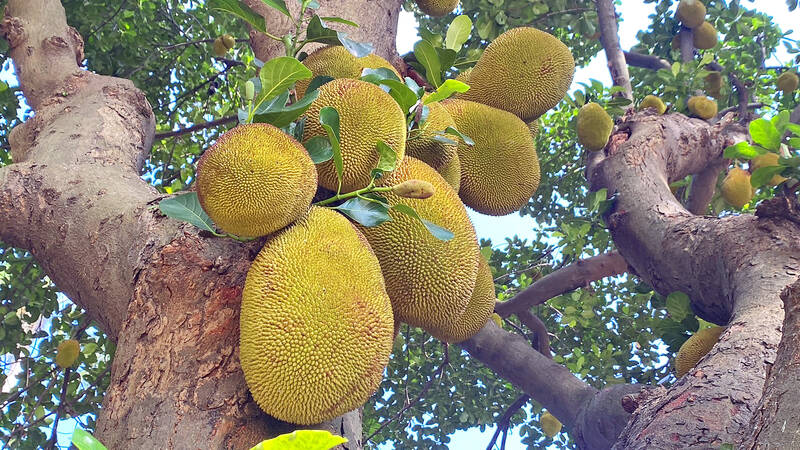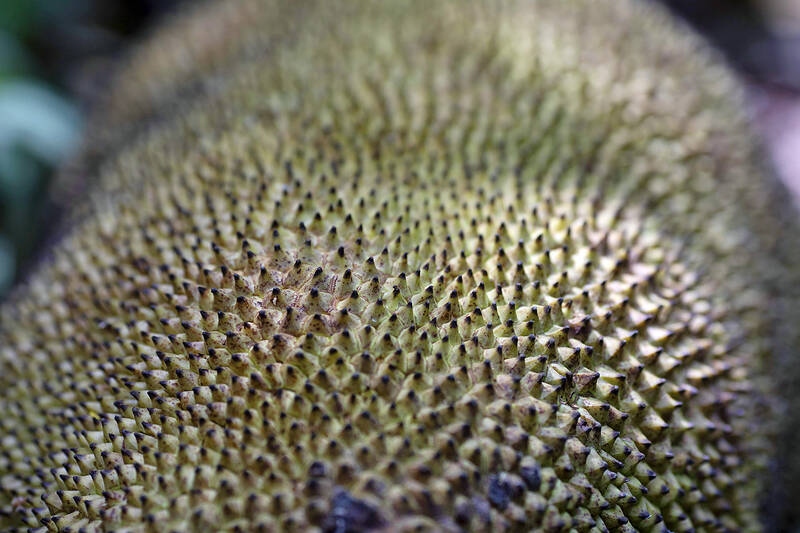Peter Brighton was amazed when he found the giant jackfruit. He had been watching it grow on his farm in far north Queensland, and when it came time to pick it from the tree, it was so heavy it needed two people to do the job.
“I was surprised when we cut it off and felt how heavy it was,” he says. “I grabbed it and my wife cut it — couldn’t do it by myself, it took two of us.”
Weighing in at 45 kilograms, it is the heaviest jackfruit that Brighton has ever grown on his tropical fruit farm, located in Feluga, south of Cairns.

Photo: Lu Heien-hsiu, Taipei Times
The second heaviest was 38 kilograms.
And the jumbo fruit likely would’ve fetched a bumper retail price. Brighton says that, depending on the availability, jackfruit often sells for between US$2 and US$6 a kilogram, and can sell for as much as US$10 at times.
“Every now and then we’ll have a munch on them in the paddock,” he says. “They sort of taste like a rock melon to me.”

Photo: AP
SOIL RICH
While Brighton isn’t sure exactly why the jackfruit grew so big, he suspects it has something to do with the microbes in the soil.
“We’re big believers in biodynamic farming — just replacing the soil with what comes out of it, just the microbes,” he says.
“We make our own microbes … my old man’s a bit of an expert in all of that stuff.”
Brandan Espe, environmental officer at James Cook University, says jackfruit normally weigh 20-30 kilograms on average.
“They can get to 35 kilograms so that [45-kilogram fruit] is pretty impressive,” he says.
Espe says jackfruit thrive in extended wet seasons, which can mean less stress on the tree and more time for it to form fruit. The tropical climate in Cairns and south of the city has organic, rich soils that are perfect for jackfruit, according to Espe.
“It could be the microbes … those areas have really rich rainforest soil,” he says. “That’s very similar to the environment [where] these things are found in the wild [in south and south-east Asia].”
VEGAN MEAT
Jackfruit is a common meat substitute and often used in curries, salads or as a pulled pork alternative.
One of its closest relations is the fiddle leaf — a common indoor plant, according to Espe.
As more people move to plant-based diets, Espe believes the fruit has a bright future.
“It’s easier to produce on a larger scale. You can grow it more sustainably, you don’t need as much fertilizer as you would other crops,” he says.
“They’re a much hardier fruit so they’re less predated by fruit bats. They’re easier to grow than the mango and are almost unkillable in the tropics climate.”
For a reference for how popular jackfruit could become, all you have to do is look at avocados, Espe says.
“Like any product, the more demand there is, the more farms will change over to this crop,” he says.
“Avocados are a fantastic example. They used to be expensive and hard to get and then everyone wanted them so a lot of farmers transitioned to growing them and now they’re everywhere.”

During the Metal Ages, prior to the arrival of the Dutch and Chinese, a great shift took place in indigenous material culture. Glass and agate beads, introduced after 400BC, completely replaced Taiwanese nephrite (jade) as the ornamental materials of choice, anthropologist Liu Jiun-Yu (劉俊昱) of the University of Washington wrote in a 2023 article. He added of the island’s modern indigenous peoples: “They are the descendants of prehistoric Formosans but have no nephrite-using cultures.” Moderns squint at that dynamic era of trade and cultural change through the mutually supporting lenses of later settler-colonialism and imperial power, which treated the indigenous as

By 1971, heroin and opium use among US troops fighting in Vietnam had reached epidemic proportions, with 42 percent of American servicemen saying they’d tried opioids at least once and around 20 percent claiming some level of addiction, according to the US Department of Defense. Though heroin use by US troops has been little discussed in the context of Taiwan, these and other drugs — produced in part by rogue Chinese Nationalist Party (KMT) armies then in Thailand and Myanmar — also spread to US military bases on the island, where soldiers were often stoned or high. American military policeman

An attempt to promote friendship between Japan and countries in Africa has transformed into a xenophobic row about migration after inaccurate media reports suggested the scheme would lead to a “flood of immigrants.” The controversy erupted after the Japan International Cooperation Agency, or JICA, said this month it had designated four Japanese cities as “Africa hometowns” for partner countries in Africa: Mozambique, Nigeria, Ghana and Tanzania. The program, announced at the end of an international conference on African development in Yokohama, will involve personnel exchanges and events to foster closer ties between the four regional Japanese cities — Imabari, Kisarazu, Sanjo and

A town in Japan is to urge all residents to restrict their smartphone use to two hours a day in an attempt to tackle online addiction and sleep deprivation. Officials in Toyoake, Aichi prefecture, said the measure would target not only children but also adults, amid growing concern about the physical and psychological toll excessive smartphone use is taking on people of all ages. The move aims “to prevent excessive use of devices causing physical and mental health issues … including sleep problems,” the mayor, Masafumi Koki said recently. The Toyoake municipal assembly began debating the non-binding ordinance this week ahead of a